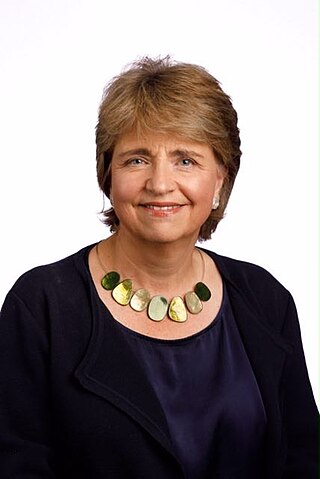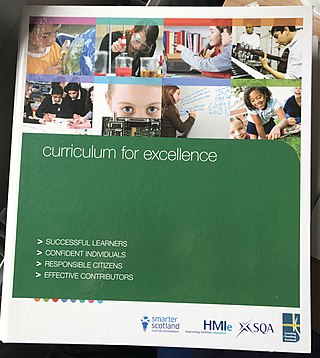Her Majesty's Inspectorate of Education (HMIe) was an executive agency of the Scottish Government, responsible for the inspection of public and private, primary and secondary schools, as well as further education colleges, community learning, Local Authority Education Departments and teacher education.

The Scottish Government is the devolved government of Scotland. It was formed in 1999 as the Scottish Executive following the 1997 referendum on Scottish devolution. It has the responsibility for the economy of Scotland, the educational system in Scotland, health care, justice, Scots law, rural affairs, housing, environment, equal opportunities, the transportation network and tax, amongst others.

The Welsh Government is the devolved government of Wales. The government consists of ministers and deputy ministers. It is led by the first minister, usually the leader of the largest party in the Senedd, who selects ministers and deputy ministers with the approval of the Senedd. The government is responsible for tabling policy in devolved areas for consideration by the Senedd and implementing policy that has been approved by it.
Education in Scotland is provided in state schools, private schools and by individuals through homeschooling. Mandatory education in Scotland begins for children in Primary 1 (P1) at primary school and ends in Fourth Year (S4) at secondary school. Overall accountability and control of state–education in Scotland rests with the Scottish Government, and is overseen by its executive agency, Education Scotland, with additional responsibility for nursery schools being the joint responsibility of both Education Scotland and the Care Inspectorate. Scotland's private schools are overseen by the Scottish Council of Independent Schools. Children in Scotland sit mandatory National Standardised Assessments in Primary 1 (P1), Primary 4 (P4), Primary 7 (P7) at the end of primary school, and Third Year (S3) in secondary school, which assist in monitoring children's progress and providing diagnostic data information to support teachers' professional judgement.

Wendy Alexander is a retired Scottish politician and the former Member of the Scottish Parliament (MSP) for Paisley North. She held various Scottish Government cabinet posts and was the Leader of the Labour Party in Scotland from 2007 to 2008. In 2010–2011 she convened the Scotland Bill Committee on financial powers of the Scottish Parliament.

Executive agencies are established by ministers as part of Scottish Government to carry out a discrete area of work. They form an integral part of the Scottish Government, but have a specific, well-defined remit. They are staffed by civil servants and headed by a Chief Executive, who is a civil servant, and are directly accountable to the government.

Learning and Teaching Scotland was a non-departmental public body of the Scottish Government, formed by the merger of the Scottish Consultative Council on the Curriculum (SCCC) and the Scottish Council for Educational Technology (SCET). It was the main organisation for the development and support of the Scottish curriculum, and was at the heart of developments in Scottish education until its merger with Her Majesty's Inspectorate for Education to form Education Scotland in 2011.

The Deputy Minister for Enterprise and Lifelong Learning in Scotland was a cabinet position in the Scottish Government. The position was created in 1999, with the advent of devolution and the institution of the Scottish Parliament, taking over some of the roles and functions of the former Scottish Office that existed prior to 1999.

The Enterprise, Transport and Lifelong Learning Department (ETLLD) was a former Scottish Executive department responsible for economic and industrial development, further and higher education, skills, lifelong learning, energy, transport and digital connectivity until 2007.

The Cabinet Secretary for Education and Skills, commonly referred to as the Education Secretary, is a position in the Scottish Government Cabinet responsible for all levels of education in Scotland. The Cabinet Secretary is supported by the Minister for Higher and Further Education and the Minister for Children, Young People and Keeping the Promise which are both junior ministerial posts.

The Minister for Higher and Further Education is a Junior ministerial post in the Education Department of the Scottish Government. As a result, the Minister does not attend the Scottish Cabinet. The post was created in May 2007 after the appointment of the Scottish National Party minority administration and the Minister reports to the Cabinet Secretary for Education and Skills, who has overall responsibility for the portfolio, and is a member of cabinet. The Minister has specific responsibility for further education and colleges, higher education and universities, science and STEM (science, technology, engineering and mathematics, student funding, youth work, and widening access to education.

The work of the Scottish Government is carried out by Directorates, each headed by a Director. The Directorates are grouped into a number of Directorates-General families, each headed by a Director-General. However, the individual Directorates are the building blocks of the system. The Directorates are further broken down into 'Divisions' and then by Units and finally by Teams. Divisions usually consist of 25-50 people. There is no direct correspondence between the political responsibilities of the Ministers in the Scottish Government and the Directorates, although in some cases there is considerable overlap. The Directorates are also responsible for a number of government agencies and non-departmental public bodies. Some government work is also carried out by Executive Agencies such as Transport Scotland, who sit outside the Directorates structure, but are also staffed by civil servants

Scottish Parliament committees are small groups of Members of the Scottish Parliament (MSPs) who meet on a regular basis to scrutinise the work of the Scottish Government, conduct inquiries into subjects within their remit and examine legislation. Much of the everyday work of the Scottish Parliament is done by these committees.
The Scottish Government Rural Affairs, Environment and Services Directorates were a group of civil service Directorates in the Scottish Government until a December 2010 re-organisation.

The Department for Education (DfE) is a department of His Majesty's Government responsible for child protection, child services, education, apprenticeships, and wider skills in England.

The Scottish Government Economy Directorates are a group of Directorates of the Scottish Government. They were rebranded as the Economy Directorates in July 2016, having previously been reorganised in December 2010 and then in June 2014. In July 2021, a further re-organisation led to the creation of the Net Zero Directorates, with Agriculture & Rural Economy, Marine Scotland, Energy & Climate Change, Environment & Forestry, Transport Scotland, Forestry and Land Scotland and Scottish Forestry moving to the new Directorate General.

The Scottish Government Education and Justice Directorates are a group of civil service Directorates in the Scottish Government created by a re-organisation.

Education in Scotland in the twentieth century includes all forms of organised education in Scotland, such as elementary, secondary and higher education. The centre of the education system became more focused on Scotland throughout the century, with the Scottish Education Department partly moving north from 1918 and new departments created by the Scottish Executive after devolution.

The Ministry of Education, Vocational Training and Sports (MEFPD) is the department of the Government of Spain responsible for proposing and carrying out the government policy on education and vocational training, including all the teachings of the education system except university education, without prejudice to the competences of the National Sports Council in matters of sports education. Likewise, it is also the responsibility of this Department the promotion of cooperation actions and, in coordination with the Ministry of Foreign Affairs, the promotion of international relations in the field of non-university education.

The Scottish Government Net Zero Directorates are a group of Directorates of the Scottish Government. The group was created in July 2021, with Agriculture & Rural Economy, Marine, Energy & Climate Change, Environment & Forestry, Transport Scotland, Forestry and Land Scotland and Scottish Forestry moving from the Economy Directorates.








